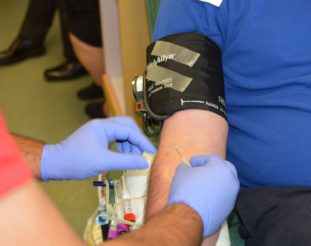Are Colon Cancer Numbers Higher in Black Communities?
The answer is: Yes! In addition, colorectal cancer rates are rising in younger, African Americans. Often we associate colon cancer with older people. While it isn’t as common in people under the age of 50, it’s not as uncommon as most people would think. According to cancer.org, in 2020 about 12% of colon cancer, about 18,000 cases, were diagnosed in people under 50 in the US. They also state that while colorectal cancer rates have been falling in older age groups, it is rising among younger people. The black community has the highest rates of colorectal cancer compared to any other ethnic or racial group in the US. African Americans are around 20% more likely to get colorectal cancer and around 40% more likely to die...

Why is blood donation more important than ever?
January is blood donation month, but is it safe to do during a pandemic? The answer is yes. “The American Red Cross is testing all blood, platelet and plasma donations for COVID-19 antibodies. As part of that effort, plasma from whole blood donations that test positive for COVID-19 antibodies may now help current coronavirus patients in need of convalescent plasma transfusions. We are committed to helping others in meaningful ways during this pandemic. Donating blood products is essential to community health and the need for blood products is constant. As part of our nation’s critical infrastructure, healthy individuals can still donate in areas that have issued shelter in place declarations or are operating under a phased reopening plan. The Red Cross follows the highest standards of safety...

Why are at-home drug tests used and what drug test is right for you?
Many families are struggling with helping loved ones deal with addiction. At-home drug testing can be an asset to help during the recovery process. At-home drug tests can be used as a preventative measure or an investigative tool. Some people believe that if a person knows that s/he will be tested on a regular basis s/he will be less likely to abuse drug substances. Urine-based drug tests can be used as an investigation tool for people in your home whom you believe may be using legal and/or illicit drugs either in or outside a work place environment. Businesses, large and small, might test new employees or have an ongoing testing routines to screen employees for illegal and prescription drugs that are commonly abused. These tests can...

5 Ways of Staying Healthy at Home
5 Ways of Staying Healthy at Home Eat healthy – Meal plan and shop for the week. Eating healthy meals at home helps you cut down on fat, salt, and sugar while saving you money. If you are working from home right now, you are probably eating out less. Make plans to try something new: new food or new ways of cooking. Get the family involved and make it a learning experience. Try themed nights that focus on different countries which make it fun and educational while trying new, healthy food. Stay hydrated! The proper amount of water and fluids will help your body fight off viruses and stay strong. With the distractions and new schedules, it is easy to forget to drink enough water and...

Are You Too Young To Get Colon Cancer?
Most people think that colorectal cancer (CRC) affects only older adults—but the facts today reveal that more adults who are under the recommended screening age of 45 are being diagnosed than ever before. According to a 2015 study by MD Anderson Cancer Center researchers, by 2030 researchers expect that rates of colon cancer will increase by 90% for people ages 20-34 and 27.7% for people ages 35-49. All men and women should be screened for colorectal cancer. Your individual risk factors – such as ethnicity, lifestyle and family history – will determine when you should start getting checked. The American Cancer Society recently recommended that adults without a family history should begin colorectal cancer screening at age 45. People under 45 who are diagnosed with colorectal are more...

Exercise and Colon Cancer Prevention
There’s no sure way to prevent colorectal cancer. But there are things you can do that might help lower your risk, such as changing the risk factors that you can control. Increasing your level of activity lowers your risk of colorectal cancer and polyps. Regular moderate activity (doing things that make you breathe as hard as you would during a brisk walk) lowers the risk, but vigorous activity might have an even greater benefit. Increasing the intensity and amount of your physical activity may help reduce your risk. In a National Cancer Institute study involving more than 1.4 million participants, researchers found that people with the highest levels of physical activity had lower rates of colon cancer compared with those who had the lowest levels of physical activity. According...

Ovulation After Stopping the Pill
If you are considering stopping the pill, chances are your goal is to get pregnant. How soon ovulation after stopping the pill will occur has probably crossed your mind. Ovulation in the first cycle after stopping the pill can vary from a few weeks to several months, according to the University of California at Davis Student Health and Counseling Services. There are several factors in the time that it can take to return. Your personal health, the type of pill you take and how long you have taken it are all things to consider. Generally speaking, ovulation will resume two to four weeks after you stop the pill. It may take a bit longer for older women and women who have been on the pill...

5 Reasons to Test for Colon Cancer
Click here to buy your at-home screening test now. 1 in 20 people will develop colon cancer during their lifetime, with both men and women being at risk. When considering men and women together, colon cancer is the second leading cause of death. The rate of deaths due to this cancer has been dropping over the past few decades. One reason is that routine screening has found polyps that are then removed before they can become cancerous. However, many people who should get screening for polyps don’t. Fecal Occult Blood is a tell-tale sign of many disease conditions, including diverticulitis, colitis, polyps, and colon cancer. However, blood in your stool isn’t always visible to the naked eye. Being able to specifically detect human hemoglobin in stool...
What To Do When You Have Cancer
According to the Mayo Clinic, “almost half of all men and a third of all women in the United States will receive a cancer diagnosis at some time in their lives.” There is no doubt that a cancer diagnosis can be surprising and frightening, but there are many resources available to help people with a new—or returning—cancer diagnosis. Here is what to do next: • Get a second opinion – If your primary care physician was the doctor who made the diagnosis, you should consider getting a second opinion from a cancer specialist, or oncologist. Even if an oncologist is the one who diagnoses your cancer, it might be worth getting a second opinion. Even if the doctors agree on your diagnosis, their treatment approaches or...
The Importance of Cancer Awareness
According to the Centers for Disease Control, colon cancer “is the second leading cancer cause of death in the United States.” It is estimated that over 135,000 Americans will be diagnosed with colon cancer in 2017 alone. People over the age of 50 are by far the most common age group affected by this disease. Despite the high number of new cases each year, colon cancer is still relatively misunderstood and not often discussed. However, it is essential for everyone to be aware of this disease and how they can prevent and screen for it. Colon cancer is often asymptomatic in the early stages of the disease, which means that most people do not initially have any symptoms and might not see a doctor...
Colon Cancer Self-Management
Dealing with a colon cancer diagnosis can be tough, as it requires adjusting to new treatment protocols, coping mechanisms, doctor’s appointments, hospitalizations and the uncertainty related to a cancer diagnosis. In addition to managing treatment with a doctor, there are many things that a person with colon cancer can do to help with their own care. Early diagnosis. The key to any cancer diagnosis is early treatment and intervention. Understanding your risk for developing colon cancer and regular screening with the doctor or with at-home screening tests like the ALFA fecal occult blood test is essential for prompt diagnosis and treatment. Educate yourself. Knowing what to expect from the course of the disease, as well as the treatment plan is very important! A knowledgeable patient can...
7 Facts You Need to Know About Colon Cancer
According to the American Cancer Society, approximately 135,000 people will be diagnosed with colorectal cancer in 2017 alone with an estimated 50,000 deaths by year’s end. As the third most commonly diagnosed cancer, this means that one in 22 men or one in 24 women are diagnosed with colorectal cancer in their lifetime. Despite this type of cancer being so common, many people don’t know that much about it. Here are 7 need-to-know facts about colon cancer Routine screening for colon cancer can be effective in early detection and treatment. People with an average risk for colon cancer are usually advised to start screening at age 50. Someone with a family history or who are at higher risk for getting cancer should talk to their...
How to Reduce Your Risk of Colorectal Cancer
Colorectal cancer is a common disease, but early detection and prevention can dramatically reduce its danger. People can’t alter the sequence of their genes, but they can take practical steps to improve their health through physical activity, eating the right things, and not eating the wrong things. Body Weight Obesity is a risk factor for colorectal cancer, meaning the more obese you are the more you are at risk of developing colorectal cancer. Obese people have inefficient metabolisms, meaning toxins in their bodies are not quenched or removed as quickly as in a healthy person. Damaging particles come from the foods that we eat, but they are also a natural byproduct of our normal cells going about their daily activity. Physical Activity The more physical activity someone...
Who Gets Colorectal Cancer
Colorectal cancer, or colon cancer, is common and has genetic causes. However, many environmental factors can dramatically increase or decrease a person’s chance of getting the cancer. Understanding how colon cancer develops and what lifestyle decisions associate with people who get it can make a big difference in reducing your risk. People Over 50 Colon cancer is a multistep process that occurs in cells over time. The longer a cell lives, the higher it’s chance of getting mutations that convert it into a cancerous state. Thus, it makes sense that colon cancer normally occurs in people who are over the age of 50. In fact, 90% of people who have this cancer were above 50 when they found out. Colon cancer is considered a “disease...
Driven Flow™ Improves Rapid POC Diagnostic Testing
Driven Flow™ Instant-view-PLUS™ Tests Give Results 5-10 Times Faster ALFA’s new, patented Driven Flow™ technology outpaces lateral flow technologies in terms of accuracy, precision and speed. What previously took 5-10 minutes can now be done as quickly as 1-2 minutes! Why wait hours for a drug test result to come back from the lab when you can get results within 1-2 minutes without having to leave the patient’s side? Faster diagnosis allows for better decisions, which means improved patient outcomes. When performing a drug test on a patient, speed is almost as important as accuracy. Detecting substances before they’re metabolized and while they’re causing symptoms is one factor. Getting rapid results to help determine the next step in the patient care path is another. Often,...
The Importance of Rapid Prescreening Tests for Colorectal Cancer
A Noninvasive Colon Cancer Test That’s FIT To Be Tried Not so very long ago, colonoscopy was the gold standard for colon cancer screening. But times are a-changing. Last month when I went in for a checkup, my primary care doctor handed me a FIT test, a colon cancer test you can do at home without the unpleasantness and risk that turn people off to colonoscopy. The FIT test, or fecal immunochemical blood test, is a newer and more accurate way to test for blood in stool, which can be a symptom of colon cancer. In June, the U.S. Preventive Services Task Force, an influential independent panel, endorsed the FIT test along with two other forms of fecal blood tests, as well as virtual colonoscopy and...